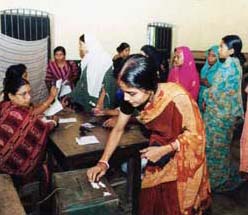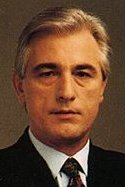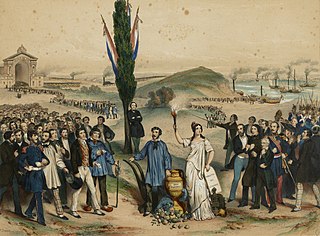Elections to determine the makeup of the legislative bodies on the three levels of administrative division in the Kingdom of Sweden are held once every four years. At the highest level, these elections determine the allocation of seats in the Riksdag, the national legislative body of Sweden. Elections to the 20 county councils (landsting) and 290 municipal assemblies (kommunfullmäktige) – all using roughly the same electoral system – are held concurrently with the legislative elections on the second Sunday in September.

Elections to the European Parliament take place every five years by universal adult suffrage. 751 MEPs are elected to the European Parliament, which has been directly elected since 1979. No other EU institution is directly elected, with the Council of the European Union and the European Council being only indirectly legitimated through national elections. While Europarties have the right to campaign EU-wide for the European elections, campaigns still take place through national election campaigns, advertising national delegates from national parties.
Regular elections in Croatia are mandated by the Constitution and legislation enacted by Parliament. The presidency, Parliament, county prefects and assemblies, city and town mayors, and city and municipal councils are all elective offices. Since 1990, five presidential elections have been held. During the same period, nine parliamentary elections were also held. In addition, there were six nationwide local elections. Croatia has held two elections to elect 11 members of the European Parliament following its accession to the EU on 1 July 2013.
Elections in Greece gives information on elections and election results in Greece.

Elections in Bangladesh gives information on election and election results in Bangladesh.

Elections in Belgium are organised for legislative bodies only, and not for executive functions. Direct elections take place for the European Parliament, the bicameral Federal Parliament, the Parliaments of the Communities and Regions, the provincial councils, the municipal councils and a few district councils. Voting is mandatory and all elections use proportional representation which in general requires coalition governments.

Elections in Malaysia exist at two levels: federal level and state level. Federal level elections are those for membership in the Dewan Rakyat, the lower house of Parliament, while state level elections are for membership in the various State Legislative Assemblies. The heads of executive branch at both the federal and state levels, the Prime Minister and Menteri Besar/Chief Ministers respectively, are indirectly elected, usually filled by a member of the majority party/coalition in the respective legislatures.
Elections in Hungary are held at two levels: general elections to elect the members of the National Assembly and local elections to elect local authorities. European Parliament elections are also held every 5 years.

Alasdair McDonnell is an Irish politician who is a member of the Social Democratic and Labour Party (SDLP), and was the Member of Parliament for Belfast South from 2005 to 2017. He was also a Member of the Legislative Assembly of Northern Ireland for Belfast South from 1998 to 2015. He was Leader of the SDLP from 2011 to 2015.

Kensington is a constituency in Greater London which first existed between 1974 and 1997, and then was recreated in 2010. Since 2017, it has been represented in the House of Commons of the UK Parliament by Emma Dent Coad of the Labour Party.
The European Parliament election of 1989 in the Netherlands was the election of MEP representing Netherlands constituency for the 1989–1994 term of the European Parliament. It was part of the wider 1989 European election. It was held on 15 June 1989. Ten parties competed in a D'Hondt type election for 25 seats.

The first elections for the European Parliament in Italy were held on 10 June 1979.

The European Parliament election of 2009 in Italy was held on Saturday 6 and Sunday 7 June 2009, as decided by the Italian government on 18 December 2008. Italy elected 72 members of the European Parliament (MEPs).
The Holland with Boston by-election, 1937 was a parliamentary by-election held on 24 June 1937 for the British House of Commons constituency of Holland with Boston.

The Scottish parliament election, 2016 was held on Thursday, 5 May 2016 to elect 129 members to the Scottish Parliament. It was the fifth election held since the devolved parliament was established in 1999. It was the first parliamentary election in Scotland in which 16 and 17 year olds were eligible to vote, under the provisions of the Scottish Elections Act. It was also the first time the three largest parties were led by women.

Federal elections were held in Belgium on 25 May 2014. All 150 members of the Chamber of Representatives were elected, whereas the Senate was no longer directly elected following the 2011–2012 state reform. These were the first elections held under King Philippe's reign.

The 2014 European Parliament election for the election of the delegation from the Netherlands was held on 22 May 2014. This is the 8th time the elections have been held for the European elections in the Netherlands.

The 1983 Navarrese regional election was held on Sunday, 8 May 1983, to elect the 1st Parliament of the Foral Community of Navarre. All 50 seats in the Parliament were up for election. The election was held simultaneously with regional elections in twelve other autonomous communities and local elections all throughout Spain.

Parliamentary elections was held in Mauritania in September 2018; the first round took place on 1 September, with a second round held on 15 September. At the national level, elections were held in 157 constituencies, each electing one member to the National Assembly. Elections were also held in 13 regional councils and 219 municipalities.

















